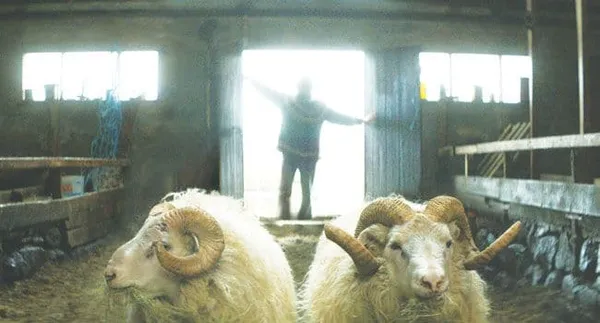 |
| Örvarsson: 'It was a very difficult film to score because it's so sensitive, so fragile. It would be so easy to be overpowering' |
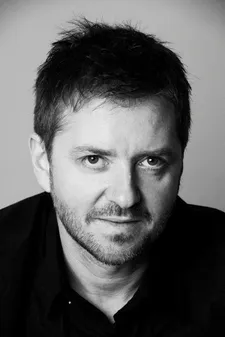 |
| Composer Atli Örvarsson: 'It's not that I never watch entertainment or mainstream things, but I wanted to do something that was closer to my heart and Rams was an amazing first opportunity' |
He says: "I had made a conscious decision to add to my career a more European slant. I'm originally from Iceland but had been working in Hollywood for 16 years. I just wanted to explore European filmmaking a bit. That's what led me attend Les Arcs European Film Festival in France, to meet European filmmakers.
"Of course, all the people I met were from Iceland. I met the producer of Rams and he told me about the project and it's kind of a crazy coincidence - they were shooting the film on the farm where my mother was born. It's a pretty remote valley, so it's not the most popular place to go and shoot a film.
"So I was very intrigued by the project and I'd heard a similar story before about two brothers who don't speak to each other but live right next to each other, and in the end I told Grímar Jónsson, the producer, that I just had to be a part of this film. It took a bit of convincing, for the director.
"Grímur, the director, went on Youtube and looked up some of my work to see if I would be the right candidate, and came to the conclusion that I definitely was not. Most of the stuff on Youtube is very commercial and quite different from what he was looking for. But I wrote him this long, long email and just told him, my family is from there – my grandfather farmed this farm you're going to film on, my great-great-grandfather played the organ in the church there – I know these people, you have to give me a chance. So, here we are."
Örvarsson says he wanted to draw on the traditional music that came from the valleys, something that was easy to do because he comes from a family of musicians.
"Typically, there would be the church organ, maybe a violin, in later times, a piano," he says. "But mostly it was a vocal tradition, people sang a lot. In the very beginning we were thinking about doing more vocal music. But it just didn't seem to fit the picture - a men's choir seemed so over-powering for two guys who rarely speak to anyone and just live in silence. But in terms of the style of the music – one of the main themes I wrote, I called The Theme Of The Ancestors, because really, other than electricity and the truck and TV, the way these people live in the movie is identical to the way it's been for hundreds of years. And there's this idea that the flock of sheep has to continue because it's been going for hundreds of years and brought along by each generation.
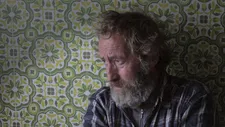 |
| Örvarsson: 'I met the producer of Rams and he told me about the project and it's kind of a crazy coincidence - they were shooting the film on the farm where my mother was born' |
Örvarsson sought inspiration for the music for the film in the church where his own ancestors played the organ.
"I believe that being from that valley helps. I felt nostalgic. I didn't grow up there but my family would visit relatives all the time and I'd go to these sheep pens and I was never drawn to animals and country life in any way but nevertheless its in my DNA somehow.
"The main accordion theme was something that came out of the blue really," he says. "I took my father's accordion with me and my father had passed away a few months earlier, so it was a very personal thing for me. I just went to the church and had a theme that I was going to record but I started playing it and thought, 'This is no good'. So I just started improvising something on the organ – I had a recording engineer with me – and I overdubbed a bit of accordion over the organ and then I went back to the organ and that's how the main theme of the film came about.
"I wrote most of the rest of the score in Los Angeles but just having tapped into the right energy in the beginning was the key.
"It was a very difficult film to score because it's so sensitive, so fragile. It would be so easy to be overpowering. The light really came on for me when I was having a conversation with Grímur and he said, 'These guys live in silence. When they are outside working or whatever there's no radio, there's nothing, just silence, so the music has to honour that'. For me, that was a gateway to figuring out what it should be."
Unusually for a film made by first-time collaborators, the music became an integral part of the shooting process rather than just being "slapped on at the end".
"As Grímur started shooting the film, he would play the accordion theme for the lead actors, so they would listen to that before they went out to perform. At the very least, I think it became more of an organic part of the film than music typically is."
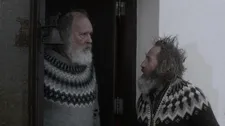 |
| Örvarsson: 'As Grímur started shooting the film, he would play the accordion theme for the lead actors, so they would listen to that before they went out to perform' |
"I've really been through the Hollywood machine, if you will," he admits. "It's like, I just realised that I wanted to work on the films that I would actually watch myself. It's not that I never watch entertainment or mainstream things, but I wanted to do something that was closer to my heart and Rams was an amazing first opportunity."
Örvarsson says both ways of working have something to commend them.
"If you're in the studio system, there's so many people involved in the decisions about the music, it's a committee," he says. "To be honest, it can also lead to interesting things. I've done films where the director had a vision, the producer had a vision and the studio had a vision and I've had to kind of find a way to combine all them - this was Hansel and Gretel Witch Hunters. Out of that came a cocktail of music that I never would otherwise have attempted to put together. But in the end, something like Rams is really just me and Grímur who decided what it should be like."
Örvarsson is relishing his fresh direction back to Europe and has scored another Icelandic film since - Óskar Jónasson's romantic comedy In Front Of Others, which had its premiere at Gothenburg Film Festival this month.
"It's been a banner year for Icelandic film but they're all a certain type of film - arthouse, independents," says Örvarsson. "The way I see it is we now have a third generation of Icelandic filmmakers.
"Friðrik Þór Friðriksson and Hrafn Gunnlaugsson were the pioneers and the next generation was guys like Baltasar Kormákur and I now feel that there's a generation who are coming into an environment of filmmaking that's a bit more mature. A lot of them have gone to film schools in Denmark or Prague and so on. It feels like the Icelandic filmmaking community has come of age."
The composer says splitting his time between LA and Iceland gives him "the best of all possible worlds."
He adds: "One of the great things about living in two places is that it gives you a certain perspective on both places.
"I was talking to Hans Zimmer about this once and, in his view, outsiders or foreigners are better suited to write music for films that talk about American culture because we have a perspective and we come at it from a different angle. I can see that point of view. There's something about being the guest or visitor and the way you look at things. You're not in the cycle of life, in a way, and you look at it with a cold way. In some ways when I came back to Iceland it's as though I've moved to a new country and I'm kind of learning the society again. I feel that it helps me there as way. That's what I feel is useful - the perspective view."
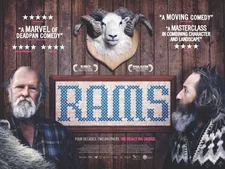 |
| Rams poster |
- Read our interview with Grímur Hákonarson
- Rams is on release in the UK now, for details of a screening near you visit the official site
- Rams is on limited release in the US, for further information visit the film's Facebook page





















